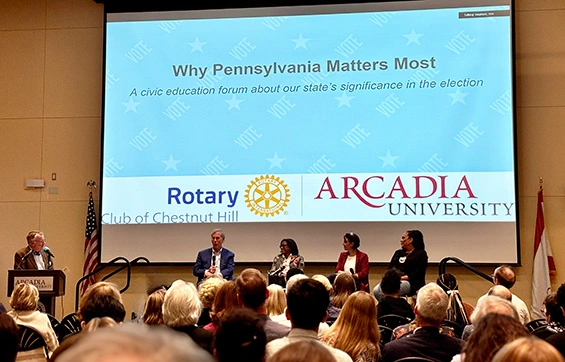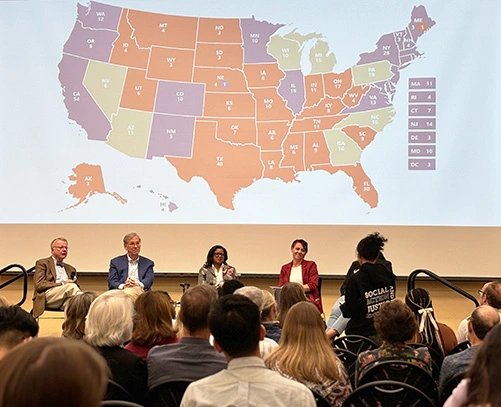What Role Will Pennsylvanians Play in the Upcoming Election?
Experts gathered at Arcadia for a nonpartisan discussion about the swing state

Pennsylvania is considered a key battleground state each presidential election. In 2016, Donald Trump won the Commonwealth by .7% of the vote, while in 2020, Joe Biden won by 1.2% of the vote. 2024 promises to be no different.
To help the Arcadia community, as well as the community at large, better understand the importance of Pennsylvania in the 2024 presidential election, the Division of Civic & Global Engagement hosted a panel discussion on Tuesday, Oct. 8, in conjunction with the Rotary Club of Chestnut Hill. The event was part of the larger Arcadia Votes initiative.
ArcadiaVotes, Montco Votes, PA Youth Vote, Vote 411, and the Rotary Club of Chestnut Hill had tables set up to provide information about the election and voting process before the event. Students had the opportunity to register to vote, request mail-in ballots, sign up for a shuttle to the Montgomery County Voter Services satellite office on Oct. 28, sign up for a shuttle to the polls on Nov. 5, and have some fun with photo props and prizes.
The panel included Angelique Hinton, executive director of PA Youth Vote; Farah Jimenez, executive director of the Philadelphia Education Fund and political analyst on 6ABC and the Philadelphia Inquirer’s opinion pages; Samuel Katz, historian, filmmaker and political analyst focused on Philadelphia; and Amy Widestrom, political scientist and executive director of the League of Women Voters of Pennsylvania.
“This is not an evening about partisan politics,” David Hawkings, former managing editor at Congressional Quarterly and the event moderator, said. “This is not an evening to advocate for one side or the other. This is an evening to be educated about civics.”
The discussion started with Hawkings asking the panel why they decided to participate in such a forum. Each panelist agreed that it is important to help voters understand the issues.
“I’m here to make sure that people understand how to mobilize and engage young people,” Hinton explained. “I work with young people every day, and I think that it’s important to understand that some young people are not getting equitable access to education around how government works, so that has a lot to do with why you see disparity in participation.”
Rebeca Velazquez and Jaden Peters, juniors at Arcadia, came to the event with an open mind. While they may be leaning one way, both said they valued the opinions of the panelists and the discussion they brought to campus
“I came for more insights into the issues and to hear how the experts view the election,” Velazquez said. “It could potentially influence my views.”
The conversation turned toward the issues that matter most to Pennsylvanians. While the national media may lead voters outside of Pennsylvania to believe that fracking is the number one issue for Pennsylvanians, the panel explained that it is just one of many that Commonwealth residents are concerned about.
“Immigration and reproductive rights are major issues that are deeply dividing,” Katz remarked. “The economic issues here are going to be very important too, particularly in southwest Pennsylvania. These are the things that are pulling us apart.”
Jimenez explained that the fracking issue can bleed over into other industries as well.
“I might have some concerns about electing a candidate that’s really more interested in regulating an industry that does provide real resources,” she reasoned. “Not just jobs for my family, but resources for the Commonwealth.”
The panel took a moment to remind the audience that there are other important elections happening around the Commonwealth this year and in the future. Other races in Pennsylvania this year include for attorney general, auditor general, and treasurer.
“What we need to do is encourage our young voters,” Widestrom said. “What matters to you? It’s okay to split your ticket, but find the person who aligns with your values. And you might have to do a little research, but I really encourage particularly young voters to lean into the issues that matter because I know that you’re not thinking much about the parties or the institutions.”
The evening ended with a question-and-answer session with the panelists. Several students were given the chance to ask the panels for their thoughts on subjects like overcoming the increasing division in the country, the impact of the two-party system in the United States, and how the Senate race in Pennsylvania will impact the overall composition of the Senate.

To hear more from the panelists, check out interviews each did with the Rotary Club of Chestnut Hill here. Students can stay up to date on upcoming events and get answers to frequently asked questions by following @arcadiabeyondcampus on Instagram.


